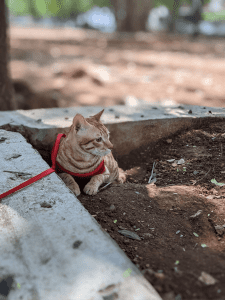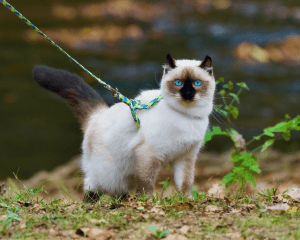Cats are naturally territorial creatures, so many pet parents assume their outdoor cat is hardwired to stick close to home. A recent GPS study that tracked the movements of 925 domestic outdoor cats revealed that our feline friends may be more adventurous than we thought, crossing busy streets with alarming frequency.
If you’re undecided on whether you feel comfortable letting your cat wander outside, check your local laws and ordinances. In Raleigh, North Carolina, “it is against the law for domesticated animals such as dogs and cats to run unrestrained within the City Limits.”

Raleigh laws prohibit loose cats for the safety of the individual animal as well as the community and environment.
Those unwanted “presents” of dead animals on your doorstep are more than just a nuisance. Each year, outdoor cats kill an estimated 1.3-4 billion birds and 6.3-22.3 billion small mammals. This level of predation in cats’ relatively small hunting territories can have severe impacts on local wildlife.
Domestic cats are not a natural part of these ecosystems and can devastate populations of songbirds, chipmunks, voles, and other small animals. Because of cats’ predatory instincts, sending them outdoors well-fed will not prevent them from hunting.
Every year, 5.4 million cats are hit by cars, and a devastating 97% of these accidents prove fatal. Outdoor cats have a much shorter life expectancy than their indoor-only counterparts. Aside from the risk of being struck by cars, these cats also face the possibility of:
Unwanted litters of kittens are a crisis in North Carolina, and shelters are often overwhelmed.
Even if you don’t let your pet out intentionally, unneutered male cats are more likely to seek out opportunities to escape the safety of your home. Getting your cat spayed or neutered doesn’t just prevent them from becoming lost or harmed while roaming the neighborhood — it’s a simple way to help protect your local cat community as a whole.
While it’s true that cats tend to wander within the (surprisingly large) area surrounding their home, a cat that is startled or frightened can easily venture too far and lose its way.
Microchipping is one of the best preventative measures pet parents can take to improve their odds of bringing their friend home if they go missing. If you suspect that your cat has slipped outside, try the following:
Check out wake.gov for more resources and tips on finding a lost cat in Raleigh.
 How to Keep Your Cat Happy Indoors
How to Keep Your Cat Happy IndoorsIf your cat is gazing longingly out the window, it doesn’t mean that they are being denied a fulfilling life indoors. Honor your cat’s natural instincts in a safe way by:
It’s important to keep your cat safe from cars and predators, but what about the thousands of feral cats facing these hazards every day?
Nonprofit organizations like Operation Catnip are working to aid Raleigh’s unhoused cat population through TNVR (trap, neuter, vaccinate, return) programs that reduce unwanted litters and transmittable diseases.
Learn more about volunteer opportunities here!